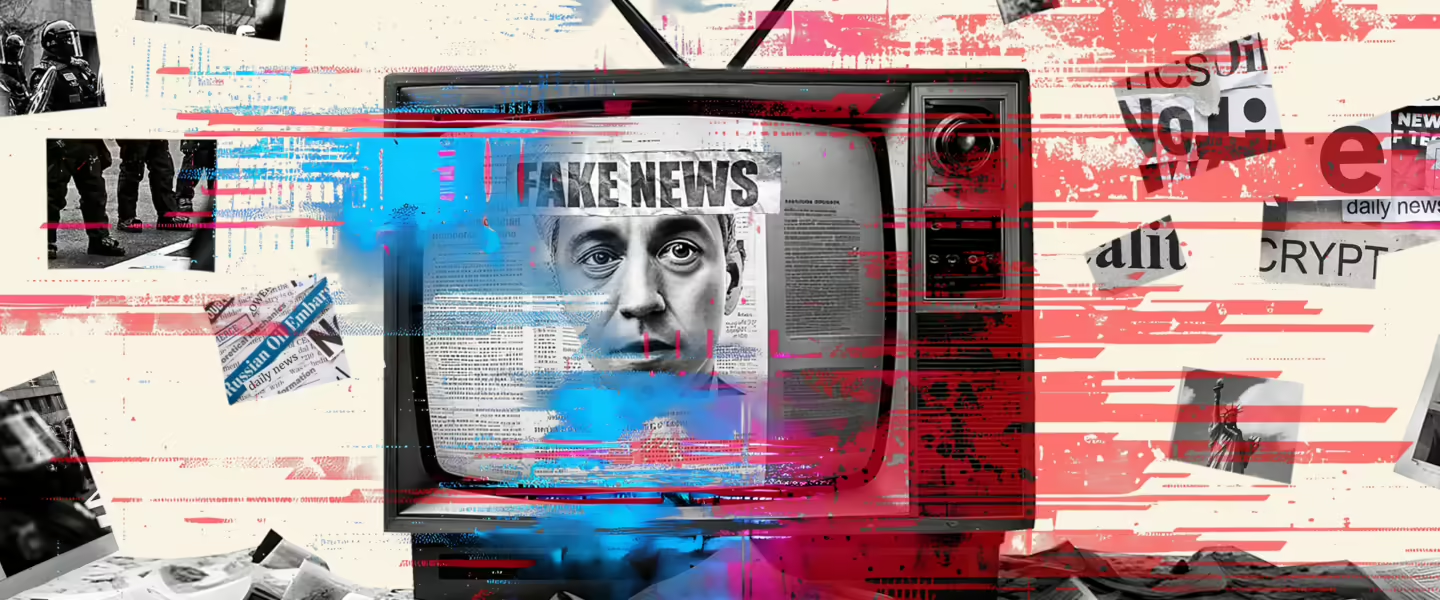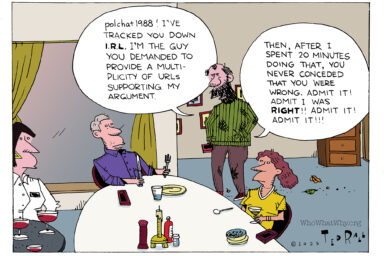A quaint tale of manipulators being manipulated.
|
Listen To This Story
|
At a time when much of the American public seems more ignorant than ever, the tools of deception have become more sophisticated than ever.
We live in an age of scams that trick the senses. Photos can be altered, films and videos can be manipulated to an exquisite degree of realism. Malware can add images of nonexistent cancerous lymph nodes to CT scans. Artificial intelligence can generate photorealistic images of people who do not even exist. Videos appear to show someone saying things in a speech they never said. Voice simulators can fool your nearest relative into thinking that it’s you on the phone asking for $500 to spring you from a prison in Timbuctu.
The 2024 election has spawned some alarming specimens of what AI can create: Fake images of “Kamala Harris” addressing a communist rally in Chicago, Taylor Swift dressed as Uncle Sam, with the caption “Taylor Swift Wants You To Vote for Donald Trump” (which was even too much for Fox News), and Trump surrounded by an adoring mob of Black people. Robocalls mimicking Joe Biden’s voice urging voters not to vote in the New Hampshire primaries.
And then there are the older tools of psychological manipulation — words that deceive the mind, not the eyes and ears — tools that have been in use for decades: The human sock puppets. The trolls who control the internet. The scams of the CIA, with its alleged department of perception management and its assets in the media. Manufactured scandals, e.g., the framing by conservative activists of Pete Buttigieg for sexual assault. The spread of false claims that genuine protesters — even children who survived mass shootings — are paid actors. Those who lie with their physical presence, that is, people who work for companies like Crowds on Demand, surrounding politicians with purchased admiration.
All of this chicanery has three main effects:
- First, much of it does the job it was intended to do, fooling all kinds of people.
- Second, knowledge that such things go on makes it easier for you to believe what you want — or what you want others to believe. Tell me nice things about your candidate, and I can say that’s fake. Tell me bad things about my candidate, and, again, I can say that’s fake.
- Third, and this is the most disturbing of all, those who are savvy about these fancy tools are actually ignorant in their own way — because they don’t know the truth when they see it.
Young Holocaust skeptics are an extreme example. They have fallen under the spell of Holocaust-deniers who seem credible to them because some have, or appear to have, advanced academic degrees. The skeptics I’m referring to are the earnest ones, not antisemites who want to create a memory hole. Young people who honestly have trouble believing what older people know is true. The Holocaust was so unspeakably grotesque that, to some, it is just inconceivble. A fairly well educated but sheltered young man once challenged me to prove such a thing ever happened.
Because of AI, he was sure he could not depend on his own eyes and ears when presented with authentic gut-wrenching evidence. He was also sure that such a fantastic thing was unlikely to have ever happened. I felt impotent and frustrated by my inability to explain. I didn’t even know where to begin.
Does truth have a distinct odor? Do some people lack a sense of its smell?
My generation grew up learning of these horrors from people we trusted. Soldiers returning from the war so horrified by what they saw they could barely speak of it. A grim-faced president and his generals making solemn announcements. A blanket trust in the media: Life magazine’s pictures; gritty black-and-white documentaries shown on TV and in movie theaters; a somber-faced Edward R. Murrow looking deeply into the camera, cigarette in hand, surrounded by smoke, as he reported on the destruction of Europe.
Bat Shit
Sometimes I like to look back — with nostalgia — on the quaint, low-tech tools of yesterday’s con artists. My favorite concerns a clumsy trick some bumbling Russian spooks tried to pull in Africa.
It was August of 1968. I was in Moscow with my husband, who was attending a UN-sponsored economics conference. While he worked to solve the world’s problems, I walked around on my own, and soon discovered a spy on my tail, a fat, huffing, sweaty fellow, with teeth the color of a decaying urinal who stank of cabbage gas.
After two days of being shadowed, I turned around abruptly, and demanded to know why he was following me. He said he was not following me. Then, he explained, he was following me for my own protection. But, he huffed, he was not following me.
I managed to lose him and wandered onto the campus of the University of Moscow. There I came upon a group of African students lounging in front of the school. They had been laughing about something.
I sat on a bench nearby, and soon one of them joined me. We became friendly and he told me a tale that explained why his comrades were in such hysterics.
He said his country was full of Russians who were pretending to be there to help — but were really there to get their hands on a particular resource, I forget which one, but it was supposed to be in a cave. The Africans didn’t want to show them which one.
So the Russian spy service, known as the KGB at the time, came up with a stunt that involved exploiting this ethnic group’s custom of keeping the skulls of their ancestors in their homes so that from time to time they could seek advice from their spirits — through their skulls — while in a drug-induced trance.
The Russians managed to rig a skull with a tiny microphone and, at the right moment, had the skull tell the Africans they should “help their brother Russians in every way they can, and tell them what they need to know.”
But the KGB goofed. The piped-in voice spoke in Swahili, a lingua franca in Africa — instead of in this group’s local dialect. No way would their ancestors speak to them in that language.
Worse yet — the skull spoke with a broad Russian accent.
The Africans took turns imitating the phony voice. But what got them laughing the most was how they had conned the Russians into thinking they actually fell for their trick. And what they did about it.
The day after the spiritual ceremony, the Africans were all smiles, and most anxious to please their “Russian brothers.” They promised to show them where they would find the treasured mineral — and led them to a cave full of bat guano.
I was never able to confirm this story. Maybe it was a lie.
And maybe it wasn’t.
***
This is an updated version of a story of mine that ran five years ago.
Related: Great Quotes on Lies, Liars, and Lying.




